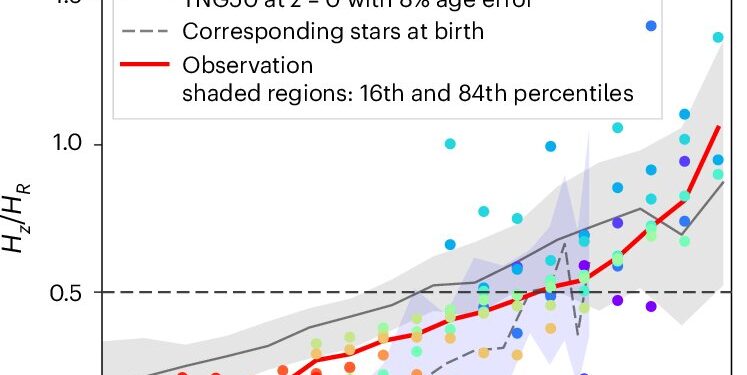Scale height/length ratio as a function of age, comparing Milky Way observations with TNG50 simulations. Credit: Natural astronomy (2024). DOI: 10.1038/s41550-024-02382-w
A team of astronomers and astrophysicists from the Chinese Academy of Sciences and the University of Toronto have discovered what they believe to be the oldest stellar disk in the Milky Way. In their study, reported in the journal Natural astronomythe group used high α stars with large orbital angular momentum to determine the ages of a wide range of stars in the galaxy.
Previous research has shown that the Milky Way began life as a single entity. Over time, it attracted several other galaxies, making it much larger: remnants of these galaxies have been discovered throughout the Milky Way. Such additions have made it difficult for astronomers to determine the original structure of the Milky Way.
In this new effort, the research team says that by dating a large number of stars in different parts of the galaxy, they were able to zero in on a particular group that they believe represents the original galactic disk. The team named the disk PanGu.
In dating the galaxy’s stars, researchers also discovered that they had a combined mass of about 3.7 billion times that of the sun. These findings challenge previous theories, because the first stars probably appeared around 400 billion years after the Big Bang, which corresponds to 13.4 billion years; they could not have belonged to structured galaxies until about 12.5 billion years ago.
This suggests that the Milky Way would not have had time to acquire such mass. But the research team presses on, further suggesting that a constant rate of star production could have resulted in the calculated mass: the remainder of the early Milky Way’s stars would have expired as supernovas.
According to the team, this leaves the current disk with 2.2 billion solar masses, a figure that represents only 0.2% of the galaxy’s current mass, demonstrating how much of the Milky Way is made up of material from other galaxies.
The team also suggests that their evidence shows that the Milky Way reached its maximum size around 11 billion years ago.
More information:
Maosheng Xiang et al, The formation and survival of the oldest stellar disk in the Milky Way, Natural astronomy (2024). DOI: 10.1038/s41550-024-02382-w
© 2024 Science X Network
Quote: Researchers claim to have found the oldest stellar disk in the Milky Way (October 15, 2024), retrieved on October 15, 2024 from
This document is subject to copyright. Except for fair use for private study or research purposes, no part may be reproduced without written permission. The content is provided for informational purposes only.



